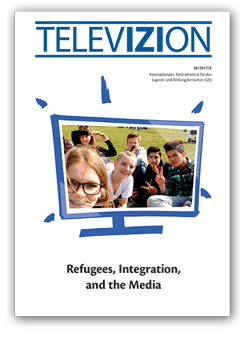|
 >> Overview publications
>> Overview publications
EDITORIAL
65 million people across the globe are living as refugees, more than ever before. According to UNHCR, the sharp increase in numbers is primarily due to protracted conflicts, and one of the largest of these conflicts is raging in Syria. The “refugee crisis” was the headline topic in media coverage over the last few years and has confronted media professionals and educators but also parents with a particular challenge, as topics that are so highly relevant in society also affect children and adolescents.
Even among 6-year-olds in Germany, almost all of the children had heard of the “refugee crisis” or seen something about it. After all, nearly everything children and adolescents know about the topic is conveyed by the media. The children thus remember images and, together with the media coverage and its specific tendencies (Hemmelmann/Wegner, vom Orde, Drüeke/Klaus), use these images to form their impressions of the situation, and decide how to appropriately deal with the topic of refugees. Here, critical media education for and about refugees is urgently needed (Dahya). Representative studies of children and adolescents in Germany have shown that especially television has become the leading medium and source of information. The studies have also revealed, however, that the amount of knowledge and degree of fear children and adolescents had on the topic depended on the broadcaster from which they obtained their information (Götz/Holler). Adolescents want facts and background information; they want to understand the situation and be able to form a reasoned opinion. And they include what they see in their worldview (Holler).
Public children’s television has aired diverse programmes on the topic in the last 2 years that encouraged awareness and empathy for refugees mostly by delivering well-founded information and personal stories from refugees (Schneid, Gulliksen et al., Lenssen, Mörchen, Drummond-Hay/Margrie). At the same time, areas can be seen that have seldom been explicitly discussed up to now such as specific experiences of violence and human rights violations (Götz/Baxter/ Pütz) and the consequences of trauma and treatment options for it (Klentzan). There are therefore still several areas in which quality media for young target groups with and without migrant backgrounds could make an important contribution to finding ways on how to appropriately and sustainably handle current challenges together with educational institutions. We will only succeed in living together peacefully if we go beyond stereotypical images of “the other” (Engelbrecht/Götz) and recognise the opportunities offered to us as a society (Jäger et al.). After all, in the end the question is: In what kind of society do we want to live?
Maya Götz
Head of the International Central Institute for Youth and Educational Television
RESEARCH
Petra Hemmelmann/Susanne Wegner
Refugees in the media discourse
In a media analysis the media coverage on the refugee crisis in Germany was examined and 5 consecutive waves of reporting were identified.
Ricarda Drüeke/Elisabeth Klaus
“Us” and “The Others”
Negin Dahya
Digital media and forced migration
Maya Götz/Andrea Holler
How children and adolescents understand the topic of refugees
In the framework of the IZI/LfM study series “How children and adolescents understand the topic of refugees”, German children and adolescents were interviewed about their knowledge, attitudes, fears, and media usage on the topic of refugees.
Andrea Holler
Refugees on TV: What children and adolescents would like to see
Konstantin Engelbrecht/Maya Götz
How do you recognise a refugee?
Maya Götz/Melanie Baxter/Anne Pütz
Settled in Germany?
Maya Götz
What shapes my self?
Uli Jäger/Anne Kruck/Dagmar Nolden/
Julia Oschinski/Nicole Rieber/Nadine Ritzi
Seize opportunities, take children seriously
PROGRAMME RESEARCH
Kirsten Schneid
Refugees on children's television
RESEARCH DOCUMENTATION
Heike vom Orde
Flight and asylum in the media
EXPERTS’ OPINIONS
Hildri Gulliksen/Nisar Ahmad Khyber/Karina/
Wroblewski/Ismihan Yilmaz/Jan-Willem Bult/
Marney Malabar/
Martina Pestaj
How to deal with the topic of refugees?
INTERVIEW
Markus Mörchen
logo! and the refugee topic: “Not scaring anyone, but not looking through rosecoloured glasses, either”
Markus Mörchen explains how the German children’s news programme logo! handles the refugee issue and questions of rumours and fake news.
Margrit Lenssen
Role models for empathy and
openness – Berlin and us!
Rachel Drummond-Hay/Kez Margrie
The Boy on the Bicycle:“Showing children what their new friends in class have been through”
Peter Klentzan
Trauma therapy with adolescent refugees
Based on practical experience from trauma therapy with adolescent refugees, the interview summarizes the most common symptoms and therapy approaches:
|




